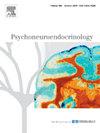Value affirmation or emotional support: The buffering effect of social rewards on psychological stress
IF 3.4
2区 医学
Q2 ENDOCRINOLOGY & METABOLISM
引用次数: 0
Abstract
Previous studies have demonstrated that social rewards can buffer the stress response. However, little is known about whether different types of social rewards differ in their buffering effects on different psychological stressors. Additionally, since psychological stress usually impairs people's cognitive performance, this study also examined whether social rewards could enhance cognitive abilities after stress. This study used the Trier Social Stress Test (Experiment 1) and Yale Interpersonal Stressor (Experiment 2) to induce performance and interpersonal stress, respectively. Two randomized controlled experiments with Chinese university students (N = 85 in Experiment 1, N = 78 in Experiment 2) compared the buffering effects of value affirmation and emotional support on stress. Furthermore, cognitive ability-enhancing effects were assessed through mental arithmetic performance (Experiment 1) and working memory capacity (Experiment 2). Results showed: 1) only value affirmation, but not emotional support, buffered the performance stress response (lower levels of cortisol, heart rate, and reports of subjective stress) compared to the control condition. 2) while both value affirmation and emotional support buffered interpersonal stress compared to the control condition, emotional support buffered better (lower cortisol and heart rate) than value affirmation. 3) Value affirmation enhanced mental arithmetic accuracy during performance stress and working memory capacity after interpersonal stress, whereas emotional support showed no cognitive benefits. These findings suggest that value affirmation is more effective at buffering performance stress, while emotional support is more effective at buffering interpersonal stress. However, only value affirmation enhances cognitive performance in both performance and interpersonal stress.
价值肯定或情感支持:社会奖励对心理压力的缓冲作用
先前的研究表明,社会奖励可以缓冲压力反应。然而,对于不同类型的社会奖励对不同心理压力源的缓冲作用是否不同,人们知之甚少。此外,由于心理压力通常会损害人们的认知表现,本研究还研究了社会奖励是否可以提高压力后的认知能力。本研究采用Trier社会压力测试(实验1)和Yale人际压力源(实验2)分别诱发绩效压力和人际压力。两个随机对照实验(实验1中N = 85,实验2中N = 78)比较了价值肯定和情感支持对压力的缓冲作用。此外,通过心算成绩(实验1)和工作记忆容量(实验2)来评估认知能力的增强效果。结果表明:1)与对照组相比,只有价值肯定而非情感支持缓冲了表现应激反应(皮质醇、心率和主观应激报告水平较低)。2)与对照组相比,价值肯定和情感支持对人际压力的缓冲效果更好,但情感支持对皮质醇和心率的缓冲效果更好。3)价值肯定提高了工作压力时的心算正确率和人际压力后的工作记忆容量,而情感支持对认知无促进作用。研究结果表明,价值肯定在缓冲绩效压力方面更有效,而情感支持在缓冲人际压力方面更有效。然而,只有价值肯定在绩效和人际压力中都能提高认知绩效。
本文章由计算机程序翻译,如有差异,请以英文原文为准。
求助全文
约1分钟内获得全文
求助全文
来源期刊

Psychoneuroendocrinology
医学-精神病学
CiteScore
7.40
自引率
8.10%
发文量
268
审稿时长
66 days
期刊介绍:
Psychoneuroendocrinology publishes papers dealing with the interrelated disciplines of psychology, neurobiology, endocrinology, immunology, neurology, and psychiatry, with an emphasis on multidisciplinary studies aiming at integrating these disciplines in terms of either basic research or clinical implications. One of the main goals is to understand how a variety of psychobiological factors interact in the expression of the stress response as it relates to the development and/or maintenance of neuropsychiatric illnesses.
 求助内容:
求助内容: 应助结果提醒方式:
应助结果提醒方式:


